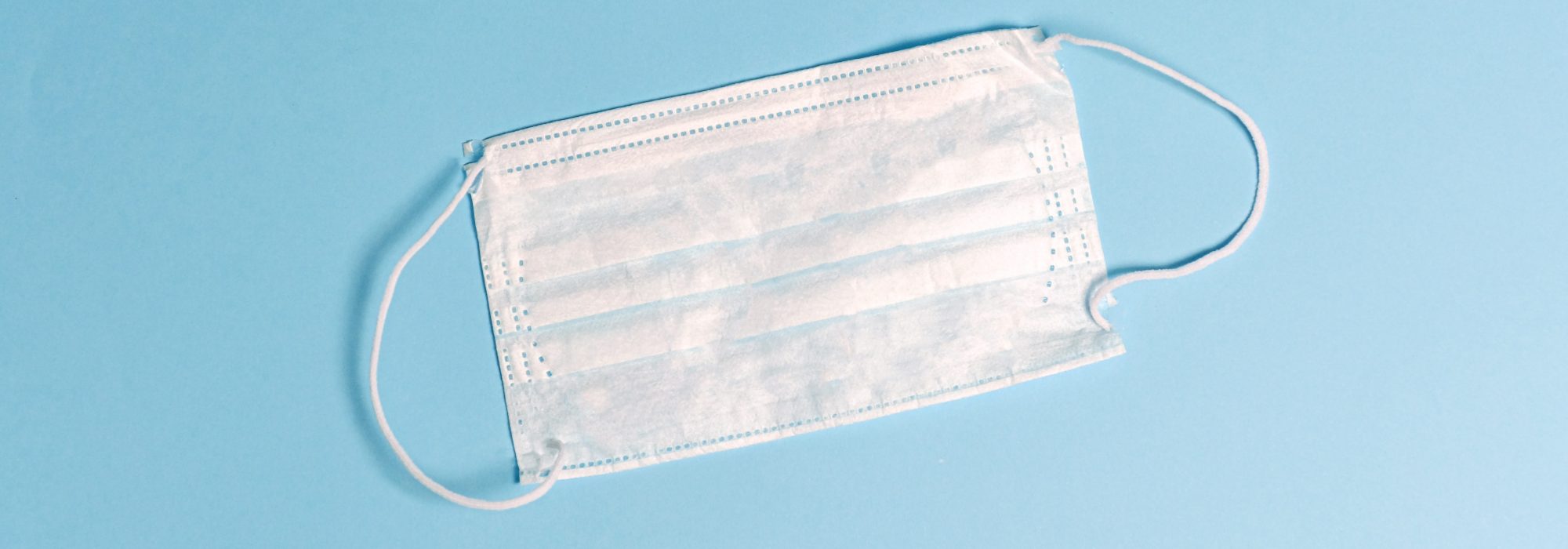Coronavirus Plastic Pollution: what we can do about it
By Jo Pike – Communications Volunteer at Thames21

Jo Pike is our newest Thames21 volunteer, supporting the ever-busy comms department. She works part-time in a zero-waste shop and is passionate about tackling plastic pollution issues, which attracted her to volunteer at Thames21.
Coronavirus has impacted all of our lives and we’ve all been taking measures to prevent its spread. But the massive increase in single-use plastic gloves and masks being used by non-healthcare professionals will negatively impact the environment, especially when these items are dumped in the environment rather than in bins. Like many of us, I’ve been happy to see pubs reopening for takeaway pints, but I’ve also noticed more and more disposable plastic cups littering the streets outside them.
I hope this blog post will help in some small way by providing stats, links to resources and tips on how we can prevent this issue. Please share these tips with friends and family, so we can spread the word and help make a difference for our planet.
Plastic waste dropped on the street gets washed into drains and from there into the local river or stream. Wind also carries lightweight plastic waste into our rivers. From our rivers, this waste is carried into the ocean. Approximately 8 million tonnes of plastic waste end up in the world’s seas and oceans every year – equivalent to the weight of 40,000 blue whales – and 80% of plastic in our oceans is from land sources. This has well-documented detrimental impacts on marine life.
The effects of coronavirus-related litter are already being seen, with the French non-profit group Opération Mer Propre sounding the alarm about plastic waste in the Mediterranean, describing ‘disposable masks floating like jellyfish and waterlogged latex gloves scattered across seabeds‘. Earlier this year OceansAsia reported discovering masses of masks washed up on the Soko Islands, Hong Kong. Eric Pauget, a French politician, has referred to masks as ‘an ecological timebomb‘ due to their 450 year lifespan. WWF Italy have reported a shocking stat – if ‘only 1% of masks were disposed of incorrectly, this would result in 10 million masks per month dispersed in the environment’, highlighting the scale of this issue.
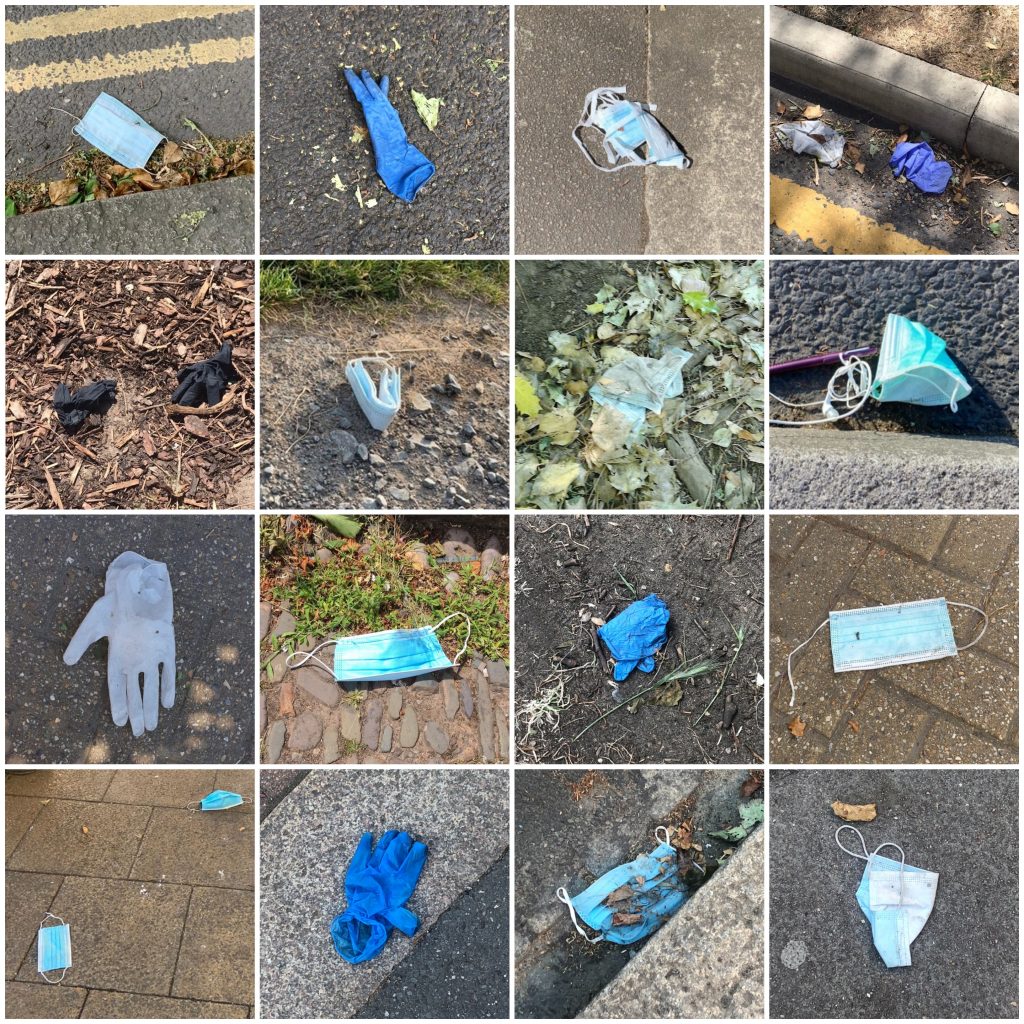
I know many of you reading this will be as disheartened as I am to see the large number of single-use gloves and masks discarded in parks and on pavements. But we can all make a difference. Read on for tips on how we can help tackle this coronavirus-related waste problem.
Buy or make reusable masks
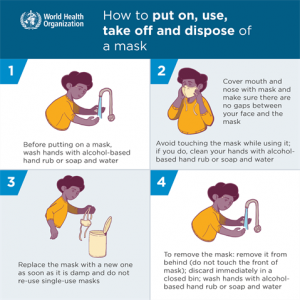
There’s some debate as to whether reusable masks are as effective as disposable ones. Edinburgh University research found that both medical-grade and home-made masks could potentially help limit the spread of coronavirus, when used correctly.
Advice in England is that the general public shouldn’t buy medical face masks, as these need to be reserved for frontline staff and key workers. Much better to support a small business, for example through etsy, and by purchasing a few that you can re-use. Masks should be cleaned after every use with your regular laundry detergent.
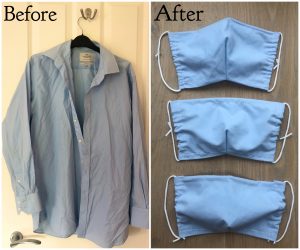
Alternatively, make your own from old clothes that you were going to donate/throw away anyway. My mum found a simple sewing pattern online and made masks using one of my dad’s old shirts.
These options are likely to save you money compared to buying and binning a new mask every day.
Encourage hand washing over glove-use
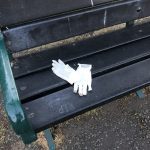
Hand washing is the safest option. The CDC states that unless you’re cleaning or caring for someone who’s sick, wearing gloves isn’t necessary and may still lead to the spread of germs. According to the WHO, regularly washing your bare hands offers more protection against catching COVID-19 than wearing rubber gloves. If you know anyone who is intent on wearing gloves to the supermarket or other places, let them know this info!
Discourage ‘tidy littering’
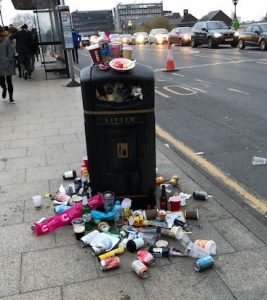
‘Tidy litterers’ go to the effort of collecting their rubbish into a bag, discover the park bins are full, and leave their rubbish bag on the floor next to the bin. Hubbub conducted a poll on 1,000 Londoners and found that ‘over half admit to squeezing litter into bins that are clearly overflowing.’ Flag up with your family and friends the importance of taking your litter home!
Watch out for clean-ups starting later this summer

We’ve been assessing what we need to put in place in order to restart our beloved Thames21 clean-ups again, especially as we know that plastic waste will have built up over the months we’ve not been out on the foreshore. We’ll be updating our volunteers about this soon. Watch out for clean-up updates on our website, Facebook, Instagram and Twitter pages. In the meantime, if you feel inclined, you can always do your own individual blitzes in your local park and many people have begun doing this. The Canal and Rivers Trust have also created guidelines for safe litterpicking near water.
Preventing unnecessary plastic waste is one of the easiest things we can do to help our environment. I hope this blog post has provided some useful tips and info that you can share with friends and family to help spread the word!
Have you noticed an increase in littered single-use plastic in your area during lockdown? Have you got any tips for tackling the increase in plastic waste? Tweet us: @Thames21.
Read more about London’s plastic waste crisis in our latest plastic pollution report.
Zac Efron joined forces with Thames21 to highlight London’s plastic problem in his new Netflix documentary Down To Earth.
More info:
Gov.uk – How to wear and make a cloth face covering
CDC – DIY cloth face coverings info
